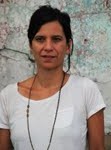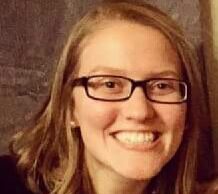Women Filmmakers Forum: Carmen Torres
 Carmen Torres graduated from the Universidad del Cine in Buenos Aires, Argentina, and also holds a B.A. in Literature and Philosophy from Universidad de los Andes in Bogotá, Colombia. She has developed her professional career in film and cultural public broadcasting. In 2010, she directed Meridiano. Her TV series on Colombian and Argentine art history, Art Tells the History, aired on the national television networks Encuentro (Argentina) and Señal Colombia. In 2008, she was the producer of Tracing the Footprints. Argentine Art, a TV series, aired on the national television network Encuentro. She worked as Director of Photography for Los Rubios (The Blondes) (2003), an award-winning Argentine documentary directed by filmmaker Albertina Carri. She has also developed curatorial work in film festivals and shows presented in Museo de Arte Moderno in Bogotá, Museo de Arte Latinoamericano in Buenos Aires, and Centro Cultural de España in Córdoba and Rosario, Argentina. She has participated as a juror of documentary film submissions for the Colombian Development Fund for Film.
Carmen Torres graduated from the Universidad del Cine in Buenos Aires, Argentina, and also holds a B.A. in Literature and Philosophy from Universidad de los Andes in Bogotá, Colombia. She has developed her professional career in film and cultural public broadcasting. In 2010, she directed Meridiano. Her TV series on Colombian and Argentine art history, Art Tells the History, aired on the national television networks Encuentro (Argentina) and Señal Colombia. In 2008, she was the producer of Tracing the Footprints. Argentine Art, a TV series, aired on the national television network Encuentro. She worked as Director of Photography for Los Rubios (The Blondes) (2003), an award-winning Argentine documentary directed by filmmaker Albertina Carri. She has also developed curatorial work in film festivals and shows presented in Museo de Arte Moderno in Bogotá, Museo de Arte Latinoamericano in Buenos Aires, and Centro Cultural de España in Córdoba and Rosario, Argentina. She has participated as a juror of documentary film submissions for the Colombian Development Fund for Film.
TFW: Could you respond to one or more of the following: What are your thoughts on the plight of women filmmakers in a male-dominated industry? Could you say a bit about feminist approaches taken up in filmmaking or filmmaking as art and a modality for social change? What is your process?
CARMEN: My creative moment is born in reflection and confrontation with my identity and the expression of my relation to the world. I begin to discern the different forms of my creation through the interplay of reason, sensibility and responsibility in a place that is dark, solitary, silent and honest. In that place, I search for the appropriate language to bring this work to life. When education is the objective, the public is the framework that sustains the idea, the structure, the aesthetic and the discourse. When the objective is to express something intimate that I want to share, the searching of myself is the motivation and the creation is the objective. In these dark and intimate spaces we are constantly confronting ourselves and, thus, the search is ongoing as the closing of one door only opens another full of new possibilities, questions, and needs. For its own part, the created object transforms following the moment in which you embark on the search. At the same time, that same instant, in which I turn towards myself, the movement forms and gives shape to the object that is created.
Once I’ve chosen the form in which I’m going to work (television, Internet, video), I choose the theme and think about the public for whom I’m going to create this work. In this case, I’m going to speak about television. I first visualize the idea and experience my feelings towards it, followed by the desire of understanding it. I study books, paintings, film, television, Internet that address the subject. I search for images that represent this theme in the reality that surrounds us. Once I understand the idea, I assemble the structure. In television, the objective has always been to educate so I think that this inspires me to try and create an educative experience for people. I begin by assuming that my public knows nothing about the subject of the work and my objective then is to create something towards which they have a desire to learn and have the impulse to explore.
I work in countries like Colombia, where the illiteracy rate was reported at 10% of the population, just this past year. I think that the poverty and general state of despair cannot be remedied without education, and due to lack of services and attention from the State, lower income communities, both urban and rural, face huge hurdles in improving their education systems. Among families and communities that have been historically and systematically left out of the education system, the pattern is difficult to break: a grandmother finishes one year of high school, none of her six children finish high school, and their children are unable to finish school and so on and so forth. Poverty, lack of education, and a static environment often go hand in hand, leaving no place to think, to reflect, to question, or to imagine life outside your immediate surroundings. When I see this occur in the communities of my own country, from my position as a filmmaker and what I have been able to study, research and question, I am moved to provide resources in an audiovisual language that is accessible to all (i.e. television) so that it can reach the largest number of people possible. A popular medium like television is important because the people already enjoy and look to this medium for entertainment as well as a source of information, it’s the form that people use in their free time.


0 comments